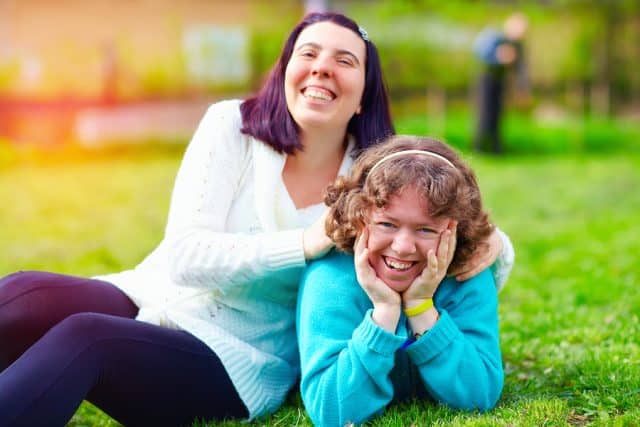
5 March 2020 – SIBLINGS GROW up together, we fight during our rocky teenage years, we can drift away a little as we try and figure out adulthood, but if the bond is strong enough, we’ll always have each other’s backs and be lifelong friends.
Sibling relationships are not just important for companionship however, as they can also play an important role in our social, emotional, and cognitive development (O’Neill & Murray, 2016). In circumstances where one sibling is autistic, other siblings can be a great source of care and support. These types of relationships are very special, however research into the wellbeing of siblings of autistic children has yielded mixed results.
Some studies highlight the positive aspects of these sibling relationships, like the neurotypical sibling becoming more caring, tolerant, exhibiting greater empathy, and being knowledgeable about their sibling’s autism. Yet other studies show that siblings of autistic children or intellectual/developmental disabilities may experience more stress and anxiety than siblings without a neurodiverse brother or sister (Jones et al., 2019; Shivers, McGregor, & Hough, 2019). This can be particularly true for siblings of autistic children.
These results tell us two things: one, that siblings are a very special and loving influence in their brother or sister’s life, and two, that taking on this role might cause them anxiety for a number of reasons, including lack of attention, confusion, and mixed feelings about their sibling’s autism, and concerns about the future.
Feeling left out
There have been reports that some neurotypical siblings feel as though they don’t receive as much social support or attention from their parents as their autistic siblings do. Taking care of an autistic child taking care of an autistic child can sometimes require a large amount of time, attention, and energy from parents and/or caregivers to make sure they are properly cared for and their needs are met. This can sometimes unintentionally lead to siblings feeling left out, or like their needs are not as important as their brother or sister’s.
Research into this has found that informal social supports, like those received from parents, friends, and extended family can be a strong protective factor against stress and anxiety for neurotypical siblings. Children who value social support and report receiving a high level of social support typically had fewer behavioural and emotional problems (Tomeny, Rankin, Baker, Eldred, & Barry, 2019). Conversely, children that really valued social support but received little from their families reported the greatest number of problems.
One way for parents to mitigate feelings of being left out is to ensure they spend fun, quality one on one time with their neurotypical children. This allows them a space away from their sibling where they can feel special and like they are the center of attention. Something as simple as playing a board game together or going to the movies can help your child feel cared for and seen.
It is also important to note that just because neurotypical siblings sometimes want some ‘me time’ away, it doesn’t mean that they dislike spending time with their brothers or sisters. In fact, research has shown that playing and interacting with siblings, particularly older siblings, can be hugely beneficial to autistic children (Ben-Itzchak, Nachshon, & Zachor, 2019). In addition to positively influencing social functioning and skill development, it is also good fun and a rewarding experience for both siblings!
Trouble understanding
Sometimes a neurotypical sibling’s anxiety can stem from a lack of understanding around their sibling’s autism. They may not fully understand their sibling’s autism, why they are acting a certain way, and why they can’t just stop behaviors that may be disruptive or upsetting. They may have irrational fears, like that they are somehow the cause of their sibling’s autism or that they will somehow ‘catch’ it from their sibling. They may also have difficulties explaining autism to others, like their friends, and they may even have unresolved anger over the impact their sibling’s autism has on their family life.
It is important to remember to let your child know that you are a safe space and that they can talk about any issues or concerns they might be having with their sibling, or in general, without fear of judgement. Acknowledge that their experiences and feelings are valid and normal and explore ways that these issues can be resolved together.
If these feelings of jealousy or perceived neglect are coming from a lack of knowledge about their sibling’s autism and how much is involved in their care, try and educate them on the matter. Working with your child to share this information can help them becoming more understanding of the situation and may even lead to them being more caring and empathetic toward their sibling.
Worries about the future
As siblings of autistic individuals get older, they begin to face several unique challenges and worries that people with neurotypical siblings don’t usually face. One of the biggest worries reported by neurotypical siblings was concern for their sibling’s future. This includes worrying about the ageing of their parents, how it will impact their autistic sibling’s wellbeing and care situation after their parents pass away, and whether they (as the closest relative) will need to take on a greater caring role once their parents are no longer able to (Moss, Eirinaki, Savage, & Howling, 2019).

When asked about concerns for the future, 43% of adult siblings were worried about the impact the death of their parents would have on their autistic sibling: “what will happen when mum dies, he’s very attached”, 77% were concerned about future care arrangements and support quality: “who will take care of him when he is older?”, and 46% were worried about the impact on themselves: “I worry that the responsibility for her care will fall to me” (Moss, Eirinaki, Savage, & Howling, 2019).
Involving neurotypical siblings, along with autistic siblings, in care plans earlier might help reduce future adult worries. For example, parents putting systems in place to ensure their autistic child will have appropriate care and bereavement support that they are comfortable with once parents are too old or pass away and keeping their neurotypical children in the loop regarding this.
Having discussions with neurotypical siblings about how involved they would like to be in current or future care to help manage their expectations about their role with their sibling once their parents are no longer capable of care could also be beneficial.
If siblings would like to be involved in their sibling’s care plan, it could be a good strategy to talk to them with their sibling about the healthcare services that their brother or sister currently uses, e.g. disability support. Adult siblings reported that they often had little to no exposure to any of these services until they reached adulthood which could be confusing and overwhelming.
Summary
Siblings play a special role in the lives of their autistic brothers and sisters. They can be great source of fun and care and support but playing this important role can also be the cause of anxiety for many different reasons. Siblings want to be included in decisions and learn more about what their sibling is going through. They want to be kept up to date with information about their sibling’s current and future care plans, and they want to feel special too. Research tells us just how important these needs are to siblings, and it has shown that when these needs are met, the results can be amazing. Not just to the siblings who are receiving more attention, information, and inclusion, but also to their autistic brothers and sisters, and the rest of the family unit.
- Ashe Yee – (B.A. – Psychology) – joined the Altogether Autism team as a researcher in late 2019. She graduated from the University of Newcastle in 2016 with a Bachelor in Psychology (First Class Honours). She is passionate about delivering evidence-based information to families in need, and in fighting against the spread of misinformation about autism. Ashe has previously worked at the University of Waikato as a researcher on the Counting Ourselves transgender health project, and was a co-author on the resulting publication.
References
Ben-Itzchak, E., Nachschon, N., & Zachor, D. A. (2019). Having siblings is associated with better social functioning in autism spectrum disorder. Journal of Abnormal Child Psychology, 47, 921-931.
Jones, E. A., Fiani, T., Stewart, J. L, Sheikh, R., Neil, N., & Fienup, D. M. (2019). When one sibling has autism: Adjustment and sibling relationship. Journal of Child and Family Studies, 28, 1272-1282.
Moss, P., Eirinaki, V., Savage, S., & Howling, P. (2019). Growing older with autism – the experiences of adult siblings of individuals with autism. Research in Autism Spectrum Disorders, 63, 42-51.
O’Neill, L. P., & Murray, L. E. (2016). Anxiety and depression symptomatology in adult siblings of individuals with different developmental disability diagnoses. Research in Developmental Disabilities, 51, 116-125.
Shivers, C. M., McGregor, C., & Hough, A. (2019). Self-reported stress among adolescent siblings of individuals with autism spectrum disorder and Down syndrome. Autism, 23(1), 112 – 122.
Tomeny, T. S., Rankin, J. A., Baker, L. K., Eldred, S. W., & Barry, T. D. (2019). Discrepancy in perceived social support among typically developing siblings of youth with autism spectrum disorder. Autism, 23(3), 594 – 606.



